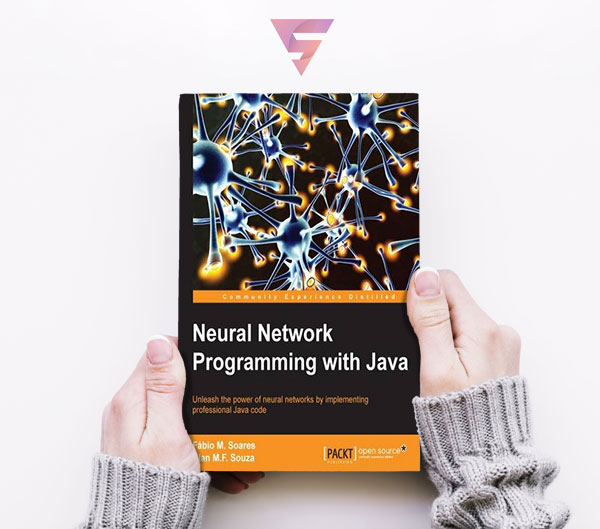Neural Network Programming with Java By Alan Souza, Fábio Soares PDF
Informations about the book:
Title: Neural Network Programming with Java
Author: Lentin Joseph
Size: 5.8
Format: EPUB
Year: 2016
Pages: 244
Book Contents:
Chapter 1: Getting Started with Neural Networks
Discovering neural networks
Why artificial neural network?
How neural networks are arranged
The very basic element – artificial neuron
Giving life to neurons – activation function
The fundamental values – weights
An important parameter – bias
The parts forming the whole – layers
Learning about neural network architectures
Monolayer networks
Multilayer networks
Feedforward networks
Feedback networks
From ignorance to knowledge – learning process
Let the implementations begin! Neural networks in practice
Summary
Chapter 2: How Neural Networks Learn
Learning ability in neural networks
How learning helps to solve problems
Learning paradigms
Supervised learning
Unsupervised learning
Systematic structuring – learning algorithm
Two stages of learning – training and testing
The details – learning parameters
Error measurement and cost function
Table of Contents
[ ii ]
Examples of learning algorithms
Perceptron
Delta rule
Coding of the neural network learning
Learning parameter implementation
Learning procedure
Class definitions
Two practical examples
Perceptron (warning system)
ADALINE (traffic forecast)
Summary
Chapter 3: Handling Perceptrons
Studying the perceptron neural network
Applications and limitations of perceptrons
Linear separation
Classical XOR case
Popular multilayer perceptrons (MLPs)
MLP properties
MLP weights
Recurrent MLP
MLP structure in an OOP paradigm
Interesting MLP applications
Classification in MLPs
Regression in MLPs
Learning process in MLPs
Simple and very powerful learning algorithm – Backpropagation
Elaborate and potent learning algorithm – Levenberg–Marquardt
Hands-on MLP implementation!
Backpropagation in action
Exploring the code
Levenberg–Marquardt implementation
Practical application – types of university enrolments
Summary
Chapter 4: Self-Organizing Maps
Neural networks' unsupervised way of learning
Some unsupervised learning algorithms
Competitive learning or winner takes all
Table of Contents
[ iii ]
Kohonen self-organizing maps (SOMs)
One-Dimensional SOM
Two-Dimensional SOM
Step-by-step of SOM learning
How to use SOMs
Coding of the Kohonen algorithm
Exploring the Kohonen class
Kohonen implementation (clustering animals)
Summary
Chapter 5: Forecasting Weather
Neural networks for prediction problems
No data, no neural net – selecting data
Knowing the problem – weather variables
Choosing input and output variables
Removing insignificant behaviors – Data filtering
Adjusting values – data preprocessing
Equalizing data – normalization
Java implementation for weather prediction
Plotting charts
Handling data files
Building a neural network for weather prediction
Empirical design of neural networks
Choosing training and test datasets
Designing experiments
Results and simulations
Summary
Chapter 6: Classifying Disease Diagnosis 117
What are classification problems, and how can neural
be applied to them?
A special type of activation function – Logistic regression
Multiple classes versus binary classes
Comparing the expected versus produced results – the
confusion matrix
Classification measures – sensitivity and specificity
Applying neural networks for classification
Disease diagnosis with neural networks
Using ANN to diagnose breast cancer
Applying NN for an early diagnosis of diabetes
Summary
Table of Contents
[ iv ]
Chapter 7: Clustering Customer Profiles
Clustering task
Cluster analysis
Cluster evaluation and validation
External validation
Applied unsupervised learning
Neural network of radial basis functions
Kohonen neural network
Types of data
Customer profiling
Preprocessing data
Implementation in Java
Card credit analysis for customer profiling
Summary
Chapter 8: Pattern Recognition (OCR Case)
What is pattern recognition all about?
Definition of classes among tons of data
What if the undefined classes are undefined?
External validation
How to apply neural networks in pattern recognition
Preprocessing the data
The OCR problem
Simplifying the task – digit recognition
Approach to digit representation
Let the coding begin!
Generating data
Building the neural network
Testing and redesigning – trial and error
Results
Summary
Chapter 9: Neural Network Optimization and Adaptation
Common issues in neural network implementations
Input selection
Data correlation
Dimensionality reduction
Data filtering
Structure selection
Table of Contents
[ v ]
Online retraining
Stochastic online learning
Implementation
Application
Adaptive neural networks
Adaptive resonance theory
Implementation
Summary
Appendix A: Setting up the NetBeans Environment
Download and install NetBeans
Setting up the NetBeans environment
Importing a project
Programming and running code with NetBeans
Debugging with NetBeans
Appendix B: Setting Up the Eclipse Environment
Download and install Eclipse
Setting up the Eclipse environment
Importing a project
Programming and running code with the Eclipse IDE
Debugging with the Eclipse IDE
Appendix C: References
Chapter 1 – Getting Started with Neural Networks
Chapter 2 – How Neural Networks Learn
Chapter 3 – Working with Perceptrons
Chapter 4 – Self-Organizing Maps
Chapter 5 – Forecasting the Weather
Chapter 6 – Disease Diagnosis
Chapter 7 – Clustering Customer Profiles
Chapter 8 – Pattern Recognition (the OCR Case)
Chapter 9 – Neural Network Optimization and Adaptation



No comments:
Post a Comment